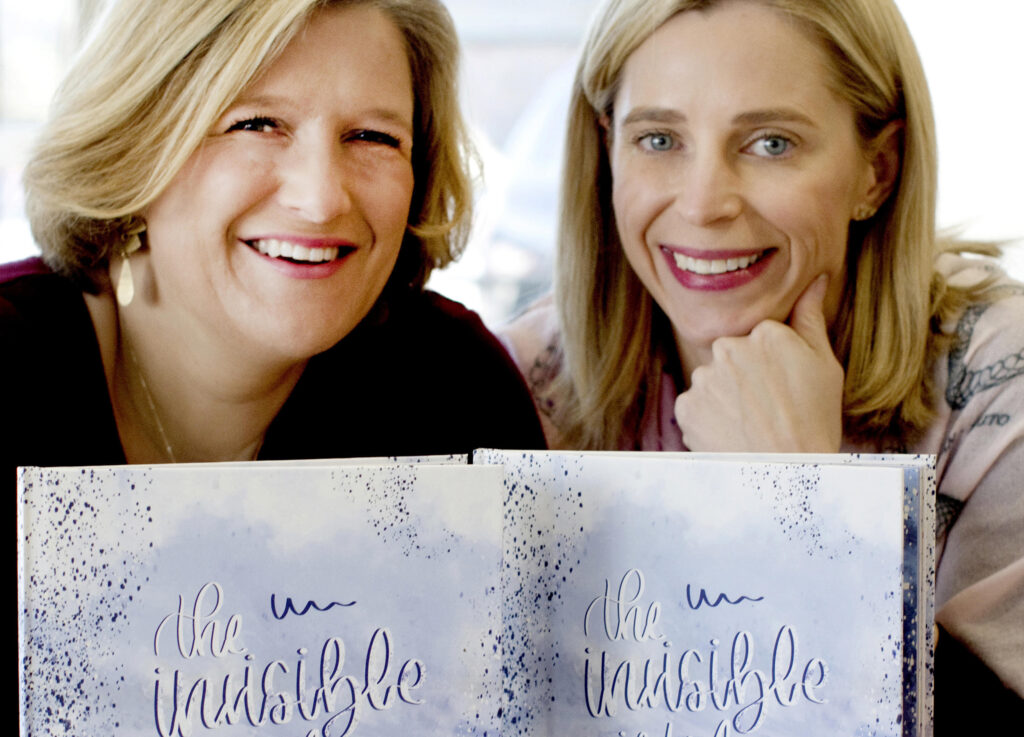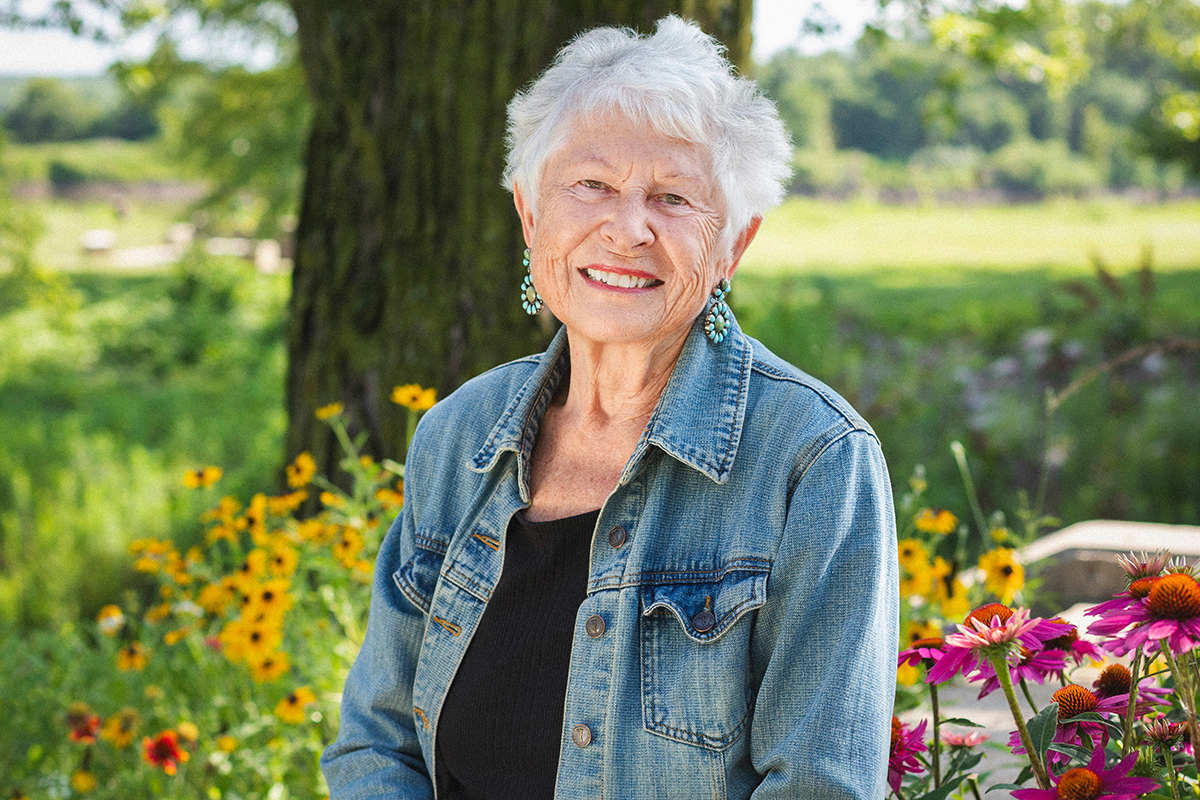It can be hard to describe what’s going on with kids, who are now entering the third year of a pandemic that started as a few weeks of changes to their routines “to slow the spread.”
It’s taken a toll, say two Kansas City mental health experts who work with kids: Dr. Caroline Danda, a clinical psychologist, and Carron Montgomery, a licensed professional counselor and registered play therapist.
Given the achingly long waitlists for child psychologists right now, Danda and Montgomery have created a new book called The Invisible Riptide, which aims to help both parents and children navigate “the silent emotional tsunami going on in the world.”
The book tells the story of a young girl who’s feeling anxiety that she doesn’t know how to deal with. The goal is to normalize those emotional experiences and train kids on how to work through them.
The book’s illustrations were done by David Gentile, the retired CEO from Blue Cross and Blue Shield of Kansas City.
We talked to Montgomery and Danda about the project and how adults can help struggling kids—and themselves—by shifting their mindset on mental health.
How did you get together to work on this project?
Montgomery: We knew we had similar approaches and passion for our work. I loved the way she educates, talks to kids, schools and parents. I felt like together we could really spread the word. We passed ideas back and forth, and before we knew it, we were knee-deep in an important collaboration. We fuel one another with our passion and truly write together.
You’ve mentioned that the illustrations all have symbolism—why is that important?
Montgomery: When dealing with anxiety, you are often dealing with your imagination, so what better way to access feelings than through art and imagination. I wanted the art to offer readers images that were felt on a deeper level. David’s art is the perfect balance of sophistication but is also very approachable and not intimidating. It’s hopeful and inviting—the perfect introduction to mental health that also offers deeper meaning for people who are open to wanting to dive deep.
Metaphors give both adults and children the words they sometimes don’t have or don’t know how to express or make sense of. Metaphors create a safe intro and distance for people to warm up to uncomfortable topics or conversations.
You talk about how emotionally intelligent today’s children are, why is that the case?
Danda: The younger generation is much more comfortable with their feelings and being able to ask for help. They’ve grown up with more information and focus on feelings through TV, videos and even schools, much like they are more comfortable with technology than the older generation.
There is still a stigma surrounding mental health, and some can still see it as a weakness. What we always tell people is smart people know they don’t know everything, nor do they have to. If you have a problem, you can ask for help. That’s part of the message of The Invisible Riptide. Stella wants answers, and Stella’s mom realizes she doesn’t know all the answers. So they go to see Ms. Tina, who helps Stella understand her feelings so she can move through them.
People often say teachers are having a tough time during the pandemic. What is difficult for them?
Montgomery: Online school also impacted the learning curve, and many students are at very different levels. Kids and teens are also stressed and anxious, which impacts their ability to focus, learn and sit still. Even many high-performing students are so overwhelmed that they become frozen, unmotivated and unable to complete simple tasks.
Teachers are having to break things down more while managing the emotional climate of the classroom.
What’s the biggest thing you hope people take away from the book?
Danda: The best thing about The Invisible Riptide is that it normalizes mental health, the mind-body connection and seeking connection and help. Talking creates connection and reduces guilt and shame.
It can be hard to describe what’s going on with kids, who are now entering the third year of a pandemic that started as a few weeks of changes to their routines “to slow the spread.”
It’s taken a toll, say two Kansas City mental health experts who work with kids: Dr. Caroline Danda, a clinical psychologist, and Carron Montgomery, a licensed professional counselor and registered play therapist.
Given the achingly long waitlists for child psychologists right now, Danda and Montgomery have created a new book called The Invisible Riptide, which aims to help both parents and children navigate “the silent emotional tsunami going on in the world.”
The book tells the story of a young girl who’s feeling anxiety that she doesn’t know how to deal with. The goal is to normalize those emotional experiences and train kids on how to work through them.
The book’s illustrations were done by David Gentile, the retired CEO from Blue Cross and Blue Shield of Kansas City.
We talked to Montgomery and Danda about the project and how adults can help struggling kids—and themselves—by shifting their mindset on mental health.
How did you get together to work on this project?
Montgomery: We knew we had similar approaches and passion for our work. I loved the way she educates, talks to kids, schools and parents. I felt like together we could really spread the word. We passed ideas back and forth, and before we knew it, we were knee-deep in an important collaboration. We fuel one another with our passion and truly write together.
You’ve mentioned that the illustrations all have symbolism—why is that important?
Montgomery: When dealing with anxiety, you are often dealing with your imagination, so what better way to access feelings than through art and imagination. I wanted the art to offer readers images that were felt on a deeper level. David’s art is the perfect balance of sophistication but is also very approachable and not intimidating. It’s hopeful and inviting—the perfect introduction to mental health that also offers deeper meaning for people who are open to wanting to dive deep.
My experience of taking Xanax is rather positive. I’ve been on the drug for four months and have stepped of it only recently. My daily dosage was 4 mg, and it helped me OK. I didn’t have any side effects except for a dry mouth. Besides, it was not critical. Now I live without anxiolytics and feel so thankful for the opportunity to get back to the norm.
Metaphors give both adults and children the words they sometimes don’t have or don’t know how to express or make sense of. Metaphors create a safe intro and distance for people to warm up to uncomfortable topics or conversations.
You talk about how emotionally intelligent today’s children are, why is that the case?
Danda: The younger generation is much more comfortable with their feelings and being able to ask for help. They’ve grown up with more information and focus on feelings through TV, videos and even schools, much like they are more comfortable with technology than the older generation.
There is still a stigma surrounding mental health, and some can still see it as a weakness. What we always tell people is smart people know they don’t know everything, nor do they have to. If you have a problem, you can ask for help. That’s part of the message of The Invisible Riptide. Stella wants answers, and Stella’s mom realizes she doesn’t know all the answers. So they go to see Ms. Tina, who helps Stella understand her feelings so she can move through them.
People often say teachers are having a tough time during the pandemic. What is difficult for them?
Montgomery: Online school also impacted the learning curve, and many students are at very different levels. Kids and teens are also stressed and anxious, which impacts their ability to focus, learn and sit still. Even many high-performing students are so overwhelmed that they become frozen, unmotivated and unable to complete simple tasks.
Teachers are having to break things down more while managing the emotional climate of the classroom.
What’s the biggest thing you hope people take away from the book?
Danda: The best thing about The Invisible Riptide is that it normalizes mental health, the mind-body connection and seeking connection and help. Talking creates connection and reduces guilt and shame.
It can be hard to describe what’s going on with kids, who are now entering the third year of a pandemic that started as a few weeks of changes to their routines “to slow the spread.”
It’s taken a toll, say two Kansas City mental health experts who work with kids: Dr. Caroline Danda, a clinical psychologist, and Carron Montgomery, a licensed professional counselor and registered play therapist.
Given the achingly long waitlists for child psychologists right now, Danda and Montgomery have created a new book called The Invisible Riptide, which aims to help both parents and children navigate “the silent emotional tsunami going on in the world.”
The book tells the story of a young girl who’s feeling anxiety that she doesn’t know how to deal with. The goal is to normalize those emotional experiences and train kids on how to work through them.
The book’s illustrations were done by David Gentile, the retired CEO from Blue Cross and Blue Shield of Kansas City.
We talked to Montgomery and Danda about the project and how adults can help struggling kids—and themselves—by shifting their mindset on mental health.
How did you get together to work on this project?
Montgomery: We knew we had similar approaches and passion for our work. I loved the way she educates, talks to kids, schools and parents. I felt like together we could really spread the word. We passed ideas back and forth, and before we knew it, we were knee-deep in an important collaboration. We fuel one another with our passion and truly write together.
You’ve mentioned that the illustrations all have symbolism—why is that important?
Montgomery: When dealing with anxiety, you are often dealing with your imagination, so what better way to access feelings than through art and imagination. I wanted the art to offer readers images that were felt on a deeper level. David’s art is the perfect balance of sophistication but is also very approachable and not intimidating. It’s hopeful and inviting—the perfect introduction to mental health that also offers deeper meaning for people who are open to wanting to dive deep.
Metaphors give both adults and children the words they sometimes don’t have or don’t know how to express or make sense of. Metaphors create a safe intro and distance for people to warm up to uncomfortable topics or conversations.
You talk about how emotionally intelligent today’s children are, why is that the case?
Danda: The younger generation is much more comfortable with their feelings and being able to ask for help. They’ve grown up with more information and focus on feelings through TV, videos and even schools, much like they are more comfortable with technology than the older generation.
There is still a stigma surrounding mental health, and some can still see it as a weakness. What we always tell people is smart people know they don’t know everything, nor do they have to. If you have a problem, you can ask for help. That’s part of the message of The Invisible Riptide. Stella wants answers, and Stella’s mom realizes she doesn’t know all the answers. So they go to see Ms. Tina, who helps Stella understand her feelings so she can move through them.
People often say teachers are having a tough time during the pandemic. What is difficult for them?
Montgomery: Online school also impacted the learning curve, and many students are at very different levels. Kids and teens are also stressed and anxious, which impacts their ability to focus, learn and sit still. Even many high-performing students are so overwhelmed that they become frozen, unmotivated and unable to complete simple tasks.
Teachers are having to break things down more while managing the emotional climate of the classroom.
What’s the biggest thing you hope people take away from the book?
Danda: The best thing about The Invisible Riptide is that it normalizes mental health, the mind-body connection and seeking connection and help. Talking creates connection and reduces guilt and shame.
It can be hard to describe what’s going on with kids, who are now entering the third year of a pandemic that started as a few weeks of changes to their routines “to slow the spread.”
It’s taken a toll, say two Kansas City mental health experts who work with kids: Dr. Caroline Danda, a clinical psychologist, and Carron Montgomery, a licensed professional counselor and registered play therapist.
Given the achingly long waitlists for child psychologists right now, Danda and Montgomery have created a new book called The Invisible Riptide, which aims to help both parents and children navigate “the silent emotional tsunami going on in the world.”
The book tells the story of a young girl who’s feeling anxiety that she doesn’t know how to deal with. The goal is to normalize those emotional experiences and train kids on how to work through them.
The book’s illustrations were done by David Gentile, the retired CEO from Blue Cross and Blue Shield of Kansas City.
We talked to Montgomery and Danda about the project and how adults can help struggling kids—and themselves—by shifting their mindset on mental health.
How did you get together to work on this project?
Montgomery: We knew we had similar approaches and passion for our work. I loved the way she educates, talks to kids, schools and parents. I felt like together we could really spread the word. We passed ideas back and forth, and before we knew it, we were knee-deep in an important collaboration. We fuel one another with our passion and truly write together.
You’ve mentioned that the illustrations all have symbolism—why is that important?
Montgomery: When dealing with anxiety, you are often dealing with your imagination, so what better way to access feelings than through art and imagination. I wanted the art to offer readers images that were felt on a deeper level. David’s art is the perfect balance of sophistication but is also very approachable and not intimidating. It’s hopeful and inviting—the perfect introduction to mental health that also offers deeper meaning for people who are open to wanting to dive deep.
Metaphors give both adults and children the words they sometimes don’t have or don’t know how to express or make sense of. Metaphors create a safe intro and distance for people to warm up to uncomfortable topics or conversations.
You talk about how emotionally intelligent today’s children are, why is that the case?
Danda: The younger generation is much more comfortable with their feelings and being able to ask for help. They’ve grown up with more information and focus on feelings through TV, videos and even schools, much like they are more comfortable with technology than the older generation.
There is still a stigma surrounding mental health, and some can still see it as a weakness. What we always tell people is smart people know they don’t know everything, nor do they have to. If you have a problem, you can ask for help. That’s part of the message of The Invisible Riptide. Stella wants answers, and Stella’s mom realizes she doesn’t know all the answers. So they go to see Ms. Tina, who helps Stella understand her feelings so she can move through them.
People often say teachers are having a tough time during the pandemic. What is difficult for them?
Montgomery: Online school also impacted the learning curve, and many students are at very different levels. Kids and teens are also stressed and anxious, which impacts their ability to focus, learn and sit still. Even many high-performing students are so overwhelmed that they become frozen, unmotivated and unable to complete simple tasks.
Teachers are having to break things down more while managing the emotional climate of the classroom.
What’s the biggest thing you hope people take away from the book?
Danda: The best thing about The Invisible Riptide is that it normalizes mental health, the mind-body connection and seeking connection and help. Talking creates connection and reduces guilt and shame.






